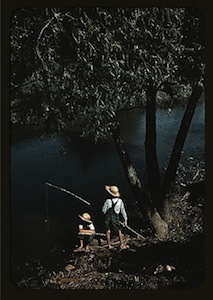 If you’re bored, craving attention, or just want to stir up a little trouble, try releasing a new edition of a classic. Preferably, make it something well-known and beloved, like Mark Twain’s Huckleberry Finn.
If you’re bored, craving attention, or just want to stir up a little trouble, try releasing a new edition of a classic. Preferably, make it something well-known and beloved, like Mark Twain’s Huckleberry Finn.
I’m sure that Twain scholar Alan Gribben expected a bit of controversy when he edited a new edition of Huck Finn that replaces the “n-word” with “slave,” and “Injun” with “Indian,” but even he may have been surprised by the outpouring of outrage.
I was first alerted to the controversy by shrieks of “censorship!” on Twitter. It was refreshing to see “#huckfinn” as a trending topic, possibly displacing a teeny-pop star or imploding politician. However, I had to mildly quibble with the use of the word “censorship” (see “Deciding How Peeved to Be Over New Huck Finn Edition“).
I’ve been following the discussion from various sources. One of the best articles I’ve read is by Miami Herald columnist Leonard Pitts, who provides several compelling reasons why it’s wrong to alter art in “Don’t Censor Mark Twain’s N-Word.” The article was accompanied in our local paper by an outstanding editorial cartoon by Pat Oliphant, one of my favorite graphic commentators.
Other good articles have been showing up, including a few from NAIWE writers. You might also enjoy these additional posts and editorial cartoons:
Literature professor Scott Andrews addresses the issue in two thoughtful posts, Goodbye, cruel word and The Other N-Word.
“Tom the Dancing Bug: Adventures of Huckleberry Finn (Corrected to reflect modern sensibilities)” offers an amusing look at what a truly sensitive version of Huck would sound like. Oddly (or perhaps not so), it sounds like a publication of the NEA.
In “Twain Redone,“ Brenda Seward talks about her reactions to Twain’s writing when she read it in elementary school (can you imagine elementary school students being expected to read either Finn or Sawyer now?), and shares her viewpoint on the change.
Linda Anger, NAIWE member and owner of The Write Concept, Inc., offers another perspective in “Altering the Classics.”
From NJ.com, an article discussing whether Twain might have expected controversy over his use of certain word, accompanied by three amusing editorial cartoons.
Mike Luckovich‘s cartoon on Mark Twain
If you’ve read an interesting article on the subject, or posted something, please feel free to post a comment below and share it. Altering the classics is nothing new, but it’s something that can easily get out of hand. People with good intentions bear watching!

The N-word in Huck Finn doesn’t offend me in the slightest.
What offends me more than anything else in the book is the sloppy plotting in the book’s second half.
That whole long digression with the two con men, “the King” and “the Duke” was just plain unnecessary. It contributes nothing to the overall storyline, wastes a bunch of pages, and fails to portray Huck, particularly, as a strong character. What, he just goes along with these shysters rather than telling them to go get bent? Huck, being a basically self-raised street kid ought to know better, right? He’s the one with street-smarts. He ought to have spotted that those guys were no good five minutes after meeting them.
But that’s peanuts compared to later, after Huck and Tom are re-united later in the book and for a period of what amounts to a couple of months of story-time, Huck goes right along with Tom’s madcap adventurism in the crazy complex garbage Tom wants to do as part of busting Jim out of captivity. Tom (a**hole that he reveals himself to be) uses Jim like a plaything for _months_ while Jim wastes away in a hot, dark log prison, worried sick the whole time about his family and if he’s ever going to see them again.
And Huck just goes right along with it. Not once does Huck stop to say “Hey, wait a minute. I just spent all this time on the river with Jim coming to realize that he’s a human being deserving of being treated with dignity just like me. This ain’t right, Tom! We have to let him out, right the heck now!”
Those two bits of poor plotting, done for the sake of madcap adventure and supposedly hilarious situations, totally sabotage the portrayal of Huck and Tom alike. I lost a lot of respect for Huck for not standing up to the King and the Duke sooner, and lost whatever was left when he didn’t stand up for Jim. Tom, well, he was likeable enough in the first book, but here he reveals himself to be a completely insensitive jerk (he’s a kid, sure, so what do I expect, but still. You don’t just leave a man in captivity when you know he’s there unjustly).
I won’t go so far as to say that Huck Finn isn’t still a classic of 19th century literature, a book with many worthy elements to it, and much of value to say about the climate of its time. But criminy. The book could certainly have benefited from an expert plot critique.
Thanks for the mention. It really is an interesting issue that raises lots of good points on both sides.